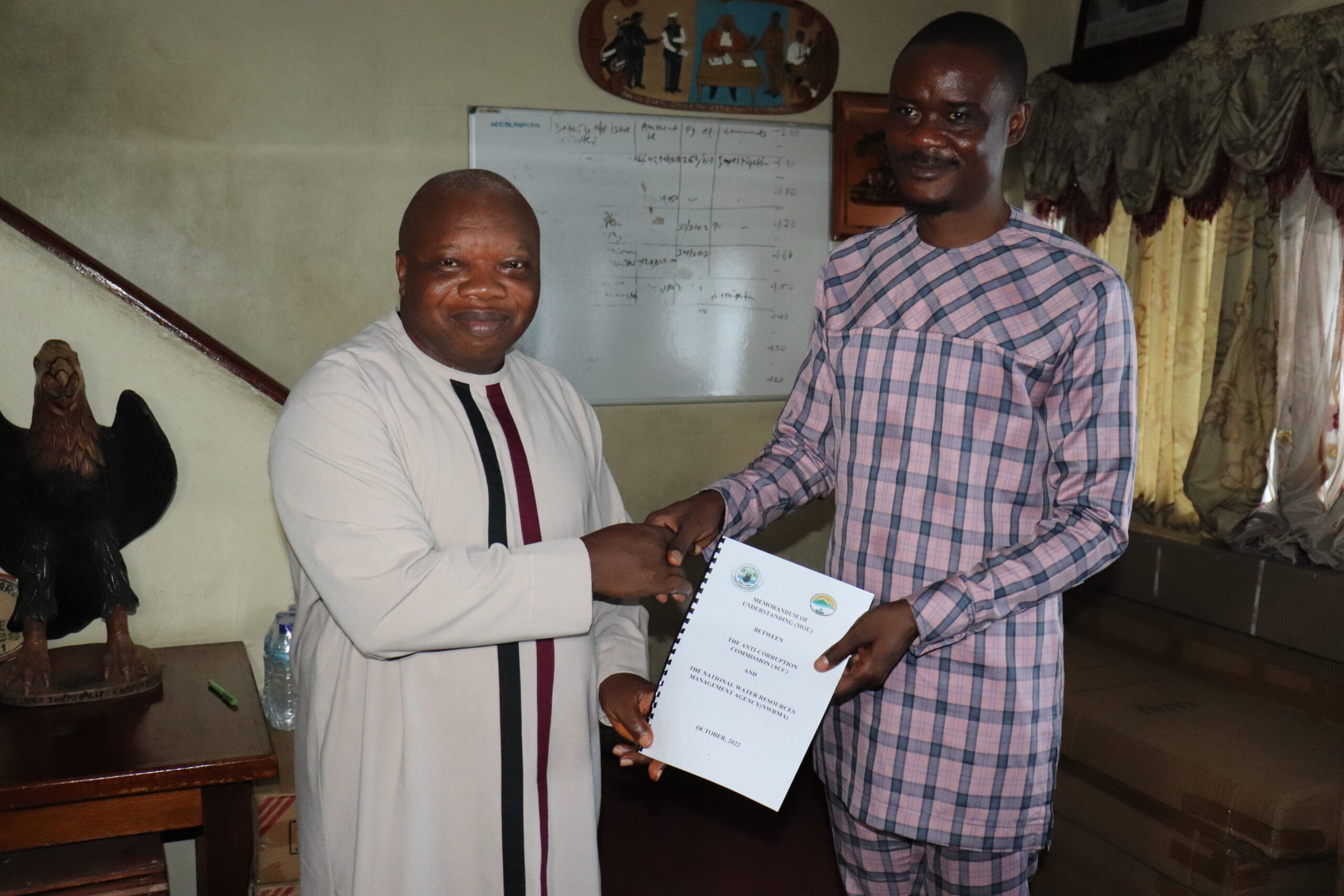Freetown, October 27th-The National Water Resources Management Agency (NWRMA) has today signed a memorandum of understanding (MoU) with the Anti-Corruption Commission (ACC) at the Commission’s headquarters in Freetown.
The agreement sets the stage to strengthen ties between the two institutions and puts in motion the required collaboration to ensure that corrupt practices related to water resources are prosecuted, existing water resources management laws are enforced, and defaulters are punished.
The National Water Resources Management Agency Act became law in 2017 and the Agency started operations in 2019, to protect conserve, regulate, utilize, and manage internal, territorial, and transboundary waters (both surface and groundwater) among competing water users, by formulating regulatory measures, granting water rights to competing users, and collecting & sharing hydrological data to maintain the water table and control water pollution.
In executing its duties, the NWRMA’s operations could sometimes be hindered by persons or institutions reluctant to comply, thereby thwarting the government’s effort to protect the country’s water resources, thus causing the government’s resources in these endeavors to waste away.
Contravention of some provision(s) of the NWRMA Act becomes a corruption offence because the water resources of this country are owned by the People and Government of Sierra Leone, thus requiring the protection, development, control, regulation, and management.
Chairing the event, ACC’s Director of Public Education, Mr. Patrick Sandi said it is a very important day because the ACC takes partnerships very seriously and as the lead institution responsible to suppress, prevent and eradicate corruption. He said they are open to work with serious-minded institutions that want to ensure accountability and effective service delivery.
“We quite understand how significant your job is, particularly when we talk about water, and its management is also crucial, especially when it comes to revenue mobilization and equally so when institutions ask the ACC to support them in ensuring that their mandates are realized. We believe that we are all working towards the development of Sierra Leone.” Mr. Sandi said.
The NWRMA Director-General, Junisa P. Bangali Esq. said the fight to protect Sierra Leone‘s water resources cannot be done in isolation and every help is needed, as prescribed by the integrated water resources management principles.
“The problem of water security to us is not a problem of water supply, but a problem of water resources management. If we’re able to manage, protect, regulate and conserve the water resources, then water supply issues will be addressed accordingly and hence, water security.” He said
The Deputy Commissioner of ACC, Mr. Augustine Foday-Ngobie said it is encouraging to note the faith fellow MDAs bestow on ACC’s work, thus the signing of an MoU like this, which will ensure that we control corruption related to water resources management in the country, especially as water is a very critical natural resource in the daily life of citizens.
“Our commitment to this partnership will not just end with signing the MoU like business as usual, but we look forward to ensuring the implementation of the contents of the MoU. We will prosecute any corrupt practice that would affect the proper management of water resources in the country.” The Deputy Commissioner said.
Highlights of the MoU include both parties agreeing to undertake compliance activities mutually determined and agreed upon to ensure public compliance with the water resources management laws; complementing each other’s effort in fighting corruption, especially where respective mandates are inter-related; providing mutual support to interests bothering on the realization of respective mandates or ensuring that revenues owed to public institutions in Sierra Leone are paid; and exchange of information and data, and provide guidance on good practices while working towards respective mandates
This partnership will go a long way to ensure that the country’s water resources are protected to prevent water scarcity which is prevalent, and water-related disasters like mudslides, flooding, etc.

